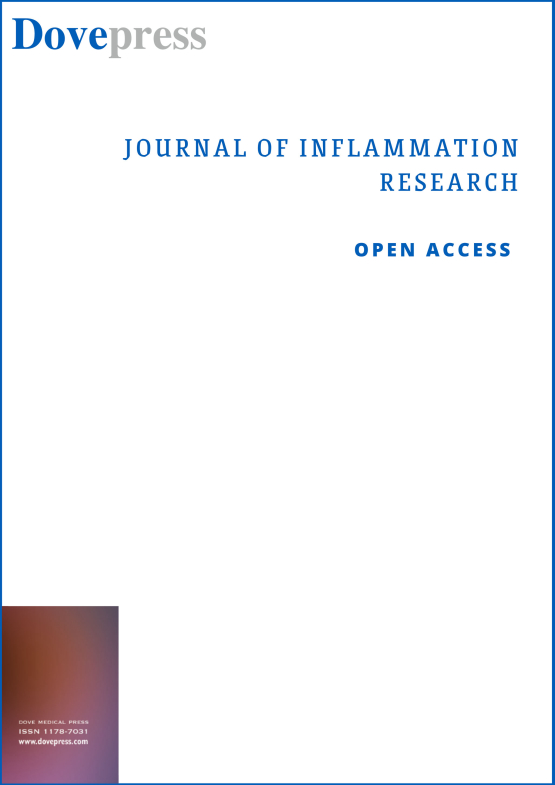Submit a Manuscript to the Journal
Journal of Inflammation Research
For an Article Collection on
Omics, Microbiome, and Artificial Intelligence: Novel Insights into Human Disease-Associated Inflammatory Responses
Manuscript deadline


Article collection guest advisor(s)
Dr. Swarna Kanchan,
Joan C. Edwards School of medicine, Marshall University: Huntington, West Virginia, US
swarnabioinfo@gmail.com
Dr. Minu Kesheri,
Joan C. Edwards School of medicine, Marshall University: Huntington, West Virginia, US
Minubsu@gmail.com
Omics, Microbiome, and Artificial Intelligence: Novel Insights into Human Disease-Associated Inflammatory Responses
The Journal of Inflammation Research, together with Guest Advisors Dr. Swarna Kanchan and Dr. Minu Kesheri, is pleased to invite you to submit your research to the upcoming Article Collection “Omics, Microbiome, and Artificial Intelligence: Novel Insights into Human Disease-Associated Inflammatory Responses”.
Understanding the integrative boost powered by omics technologies, human microbiota, and artificial intelligence is transforming our approach to various human diseases. Omics technologies such as epigenomics, genomics, transcriptomics, proteomics, and metabolomics provide comprehensive molecular insights for both host and microbial factors inducing inflammation, especially the dysregulated and chronic inflammation leading to various human diseases. The gut microbiota plays a pivotal role in modulating the immune system often linked to the onset and progression of various inflammatory and autoimmune diseases and maintaining homeostasis. Recent advances in multi-omics integration, powered by artificial intelligence, are enabling researchers to unravel complex host-microbe interactions, identify disease-associated molecular signatures such as driver genes and molecular pathways, and predict patient-specific responses to various therapies advancing precision medicine by facilitating earlier diagnosis, personalized treatment strategies, and improved outcomes for individuals affected by inflammatory conditions.
This topic is important because it addresses the growing need for comprehensive strategies to tackle inflammatory diseases responsible for one of the major causes of morbidity and mortality worldwide. By integrating multi-omics data, understanding the role of the microbiota, and leveraging the capabilities of artificial intelligence, researchers can gain exceptional insights into the complex mechanisms driving inflammatory responses. A comprehensive understanding of the molecular mechanisms, microbial influences, and individual variations is essential for developing effective therapies. This interdisciplinary approach has the potential to identify unique biomarkers, new therapeutic targets to develop novel and personalized medicines, and improve patient outcomes in a wide range of conditions, including inflammatory, autoimmune disorders, metabolic diseases, and cancer. Ultimately, a deeper understanding of these interactions will lead to more effective and targeted treatments, reducing the burden of inflammatory diseases on individuals and healthcare systems.
This special issue delves into how multi-omics approaches, gut microbiota dynamics, and artificial intelligence (AI) synergize to provide novel insights into inflammatory responses and mechanisms. The journal welcomes original research manuscripts, reviews, hypothesis formation, expert opinions, etc., relating to all aspects of inflammation.
Potential Subtopics:
- Multi-Omics Profiling of Inflammatory Diseases: Integrating epigenomics, genomics, transcriptomics, proteomics, and metabolomics to identify key molecular signatures associated with different inflammatory conditions leading to various diseases.
- Microbiota's Role in Inflammation: Investigating how gut microbiota composition and function influence inflammation (dysregulated and chronic), including various metagenomics studies on dysbiosis, and host-microbe interactions.
- AI-Driven Analysis of Inflammatory Data: Applying machine learning and bioinformatics to analyze complex omics and clinical data, predict disease biomarkers, identify potential therapeutic targets, develop diagnostic personalized therapies, and improve patient management.
- Novel Therapeutic Strategies Targeting Inflammation: Exploring new treatments, including precision medicine approaches, that modulate inflammatory responses by targeting specific molecular pathways or the gut microbiota.
Upon submission, please use the promo code 5F037 for 10% off the advertised article processing charge and indicate that your manuscript will be considered for the “Omics, Microbiome, and Artificial Intelligence: Novel Insights into Human Disease-Associated Inflammatory Responses” Collection. Please contact the Commissioning Editor, Ashley Ambros, with any questions concerning this Collection.
Keywords: Multi-Omics; microbiome; machine learning; precision health; inflammatory diseases
Dr. Swarna Kanchan is associated with Joan C. Edwards School of Medicine, Marshall University, Huntington, West Virginia, USA. He has published several peer-reviewed research articles, review articles, book chapters and books with international publishers. He is peer reviewer and editorial board member of international scientific journals and committees. He has delivered invited lectures, and attended various conferences, workshops at national and international institutions in India, France, Germany, Switzerland, Poland and the United States of America.
Dr. Minu Kesheri is associated with Joan C. Edwards School of Medicine, Marshall University, Huntington, West Virginia, USA. She has high impact peer-reviewed international publications in the form of research articles, review articles, book chapters, and books. She is the peer reviewer and editorial board member of international scientific journals and committees. She has delivered invited lectures, participated into various conferences, workshops at national and international institutions in India, France, Germany, Switzerland, Poland and the United States of America.
Benefits of publishing open access within Taylor & Francis
Global marketing and publicity, ensuring your research reaches the people you want it to.
Article Collections bring together the latest research on hot topics from influential researchers across the globe.
Rigorous peer review for every open access article.
Rapid online publication allowing you to share your work quickly.
Submission Instructions
All manuscripts submitted to this Article Collection will undergo desk assessment and peer-review as part of our standard editorial process. Guest Advisors for this collection will not be involved in peer-reviewing manuscripts unless they are an existing member of the Editorial Board. Please review the journal Aims and Scope and author submission instructions prior to submitting a manuscript.
